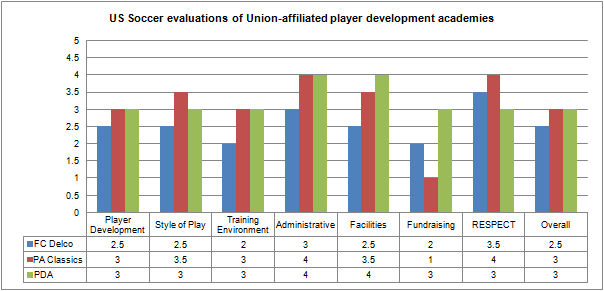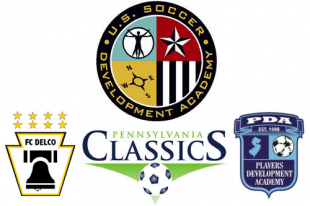Some 78 clubs currently comprise US Soccer’s Development Academy and three of those clubs—FC Delco, PA Classics and Players Development Academy—are part of the Philadelphia Union’s Youth Development Affiliate program.
Evaluations of these clubs were first started by US Soccer in 2007 with the founding of the Development Academy. Now, for the first time, the evaluations have been made publicly available.
The evaluations use a five star system to rate seven categories: Player Development, Style of Play, Training Environment, Administration, Facilities, Fundraising, and Respect. The evaluation period covers the 2010-2011 season, during which 77 clubs were part of the Development Academy.
Claudio Reyna, U.S. Soccer’s Youth Technical Director, explains, “So if Barcelona and Ajax are five stars—that’s what we work off. It’s a realistic view of where we are compared to the rest of the world. Some of the clubs have very good coaches and play well, but their facilities are not great—but that doesn’t weigh as much. The most important thing that we really highlight is the style of play, the training, the player development over the years, how many players go to the national team program relative to the player pool in the market.”
Accordingly, Player Development, Style of Play and Training Environment are at weighted at 20 percent while the other categories are weighted at 10 percent each.
How they did
If the development programs at Ajax and Barcelona are given five star ratings, the Union affiliates did quite well with PA Classics and Players Development Academy both receiving three star ratings overall and FC Delco receiving a two-and-a-half star rating.
 To put the numbers in perspective, the IMG Academy in Bradenton earned an overall rating of three-and-a-half stars. Only 18 clubs earned at least three stars in player development and style of play. Ten of those clubs, including PA Classics and PDA, are now affiliated with MLS clubs. Of the eleven clubs that earned five stars for fundraising, nine are affiliated with MLS clubs.
To put the numbers in perspective, the IMG Academy in Bradenton earned an overall rating of three-and-a-half stars. Only 18 clubs earned at least three stars in player development and style of play. Ten of those clubs, including PA Classics and PDA, are now affiliated with MLS clubs. Of the eleven clubs that earned five stars for fundraising, nine are affiliated with MLS clubs.
What the categories mean
Below are the descriptions of each category as defined by US Soccer.
- Player Development: Based on history of YNT players produced, professional players produced, quality of the player pool, number of player developed internally by the club and player improvement
- Style of Play: Based on the style of play from Academy games in the 2010-11 season
- Training Environment: Based on the quality of the training sessions conducted by the club and quality of the training log kept by the coaches
- Administrative: Based on the clubs ability to fulfill the administrative responsibilities required by Academy clubs, including scheduling, marketing, registration, web site maintenance, communication and attendance at required Academy events
- Facilities: Based on the quality and availability of the club’s training and match facilities
- Funding: Based on the club’s ability to reduce player fees to participate in the program
- RESPECT: The RESPECT Campaign was launched in May 2010 by newly hired Youth Technical Director Claudio Reyna in an attempt to improve the level of professionalism throughout the Development Academy program. The RESPECT grade is based on a club’s disciplinary record, professionalism of staff and parent sideline behavior.
An eighth category, Zone 1 & 2 Plan, is described as “Based on the clubs programming in Zone 1 and Early Zone 2, including providing players with developmentally focused competitive and training environments consistent with U.S. Soccer standards for player development.” No rating is given but each of the Union affiliated clubs is described as “completed” for this category.
The purpose of the evaluations
Claudio Reyna told Soccer America, “We feel the only way to continue to improve is to make sure we hold the clubs accountable to what they’re doing. They don’t like it [being made public]. They’re a little protective, which is normal. But our message is that it’s part of improving to put these out in the open to discuss.”
Reyna continued, “We also hope these evaluations can help parents ask important questions—not in a negative way—of their clubs. The idea is to lay out what we’re trying to do and not hide anything.”
That said, the article at Soccer America notes this caveat from US Soccer: “These evaluations are not useful to draw comparisons between Academy club programs and other domestic programs or teams associated with other organizations.” Rather, as author of the article, Mike Woitalla, notes, “Perhaps the most valuable aspect of the evaluations is that it takes the focus off results. A club that creates a good environment for long-term player development but doesn’t win titles can point to the evaluations as evidence of the validity of its approach.”
As the traditional route of high school into college play is supplanted by the emerging youth academy system, one in which increased investment from MLS clubs is benefiting not just the professional game but the US national team, these evaluations will prove to be a useful way to rate the continuing evolution and improving quality of the game in the US.


GO DC!!! good rating, considering Dc are a team at the middle to near the bottom of the league in terms of financing, it is great to see DC do so well with far fewer resources
Gotta wonder how they compare to YSC’s Union Juniors program, if that counts in the same kind of thing…
You have to think FC Delco are stewing with the ratings coming out with PA Classics and PDA having higher ratings. I am surprised by this seeing how many national team players that have come through Delco as compared to PA Classics. I can think of at least 20 kids that have come through. I wonder if the ratings were weighted heavily towards developing their own players, which Delco did not for a long time, so that may be a factor. I am surprised by this.
I do think that they are focused on locally developed players. A lot of the name players that came through FC Delco were from a very large geographic area and were often recruited to play just in tournaments or other big events. The Academy system puts more of an emphasis on consistent training and league play.
Correct. Take for example Pfeffer: he spent circa 6 months at FC Delco but was really developed by YMS. Other things against FC Delco: they do not have their own fields (until the recent merger) and the results last couple of years were nothing to shout about.
Why is PDA part of the Union’s group? Aren’t they in Central/North Jersey?
My partner and I stumbled over here from a different web address and thought I may as well check
things out. I like what I see so now i’m following you.
Look forward to looking into your web page for a second time.